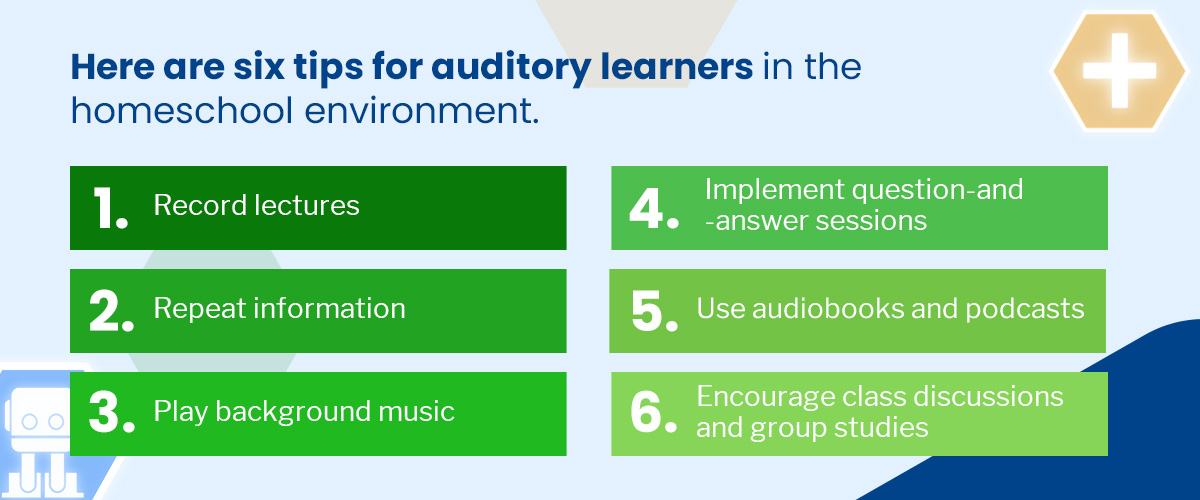Many parents choose homeschooling because it lets them create a personalized educational experience for their children. Understanding your child’s learning style will help you teach to their strengths. This guide explains what aural learning is and provides tips for implementing effective auditory learning techniques.
What Is an Auditory Learning Style?
Aural learners retain information by listening to lectures, conversations, videos or music. For example, they might memorize their multiplication tables by singing songs. These students share numerous characteristics.
- Great listeners: Auditory learners have excellent memories for spoken information and are often good at understanding and processing changes in tone and voice. They may also remember names more often than faces and prefer spoken directions over written ones.
- Strong speaking abilities: Telling stories and explaining ideas clearly and coherently is another trait of these learners. They may be confident about voicing their ideas in group discussions.
- Better concentration in quiet places: Noisy surroundings may cause them to lose focus more easily. For this reason, they may prefer studying in a quiet room where they can read aloud to themselves or listen to an audiobook through earbuds.
Strengths and Weaknesses of Auditory Learners
There are many advantages of being an auditory learner.
- Multiple learning options: These students have various technology resources for learning effectively. For instance, they might reinforce their knowledge with audiobooks, videos and podcasts.
- Multitasking: Auditory learning allows some students to do activities like chores, homework or exercise while listening to an audio recording of a lesson.
- Good scores in oral exams: These students may do better in oral exams and presentations due to their confidence and verbal communication skills.
Aural learners may also need additional help with their education.
- Difficulty with visual information: Auditory learners may struggle to stay engaged with textbooks, worksheets and other written schoolwork material. It may help to explore homeschooling and curriculum options that support auditory learning styles, such as class discussions and lesson audio.
- Potential distraction to others: Because these learners understand and retain information best through reading aloud, they may distract other students in a traditional setting. At home, your aural student can read aloud as they please, studying independently while avoiding noisy classroom environments.
Effective Auditory Learning Techniques for Homeschool Students
If you’ve discovered that your child is an auditory learner, you can implement new techniques to help them understand and retain information effectively. Here are six tips for auditory learners in the homeschool environment.

- Record lectures: Besides taking notes during class, allow the student to record the lecture. They can listen to these recordings to review anything they missed or improve their memory retention while studying for a test. Auditory learners may also want to record themselves reading textbook notes while studying.
- Repeat information: Encourage your child to rephrase ideas to reinforce and understand their meaning. Explaining the concept as if they are teaching someone else may allow them to identify and work on areas they are less familiar with.
- Play background music: Background music may help students mask distracting noises and silence. Homeschool parents can also incorporate music into lessons. For example, younger children can learn the alphabet song, while older students can learn about science through a song about respiratory systems. Using rhymes and mnemonics may also help auditory learners remember concepts.
- Implement question-and-answer sessions: Auditory students may be more likely to remember information about learning topics when they ask questions and listen to answers. Studying aloud with you or a friend through question-and-answer sessions may also keep them engaged. If your child finds it challenging to answer specific questions, it points to knowledge gaps they can improve upon.
- Use audiobooks and podcasts: Auditory learners can listen to podcast lessons and audiobooks while exercising or going on a long drive. Even without taking notes, listening may help them enhance their listening skills and memory retention.
- Encourage class discussions and group studies: Elevate lessons with classroom discussions on particular topics so auditory learners can listen, speak and interact with others about them in a fun and engaging way. You may even help your child connect with other homeschooling students to work on projects as a group.
Ways to Adapt Homeschool Learning Strategies for Auditory Learners
There are various ways to make the homeschool environment more suited to auditory learners.
- Speech-to-text software: If an aural learner has issues expressing their thoughts during written assessments, allow them to use a tool that types for them as they talk. They can save the resulting text and use it as notes to study for exams.
- Video lessons: Curricula that offer video or audio lessons may better suit your child’s learning style and help them understand information more thoroughly. YouTube videos may expand their knowledge through listening, while the visuals help them understand aspects they can’t imagine.
- Flexible curriculum and schedule: An adaptable curriculum and schedule lets your auditory learner practice verbal exercises between lessons. These activities might include speech-to-text note-taking, question-and-answer sessions or class discussions.
- Conductive auditory learning environment: Create an auditory learning environment where your student can thrive. For instance, allow them to work in a quiet space with little distractions and background noise. It may also be a safe space where the student can freely read aloud and have class discussions with their homeschooling parent or friends.
Explore Resources for Aural Learners from Power Homeschool
The educational techniques students and parents implement impact the homeschool experience. Understanding how your child learns best will help you make informed decisions about their educational needs. Power Homeschool is the official provider of hundreds of Acellus® courses for homeschooling parents.
As a homeschooling platform you can adapt to various learning styles, we offer flexible curricula for students from pre-kindergarten to grade 12 to take at their ideal pace. For more information, explore our resources for families or browse our comprehensive and interactive homeschool courses today.


